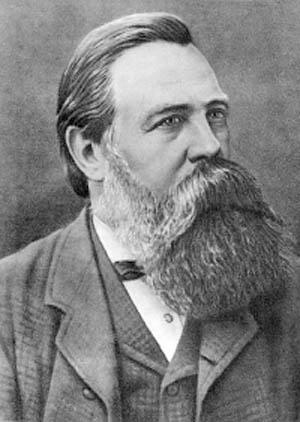Origine: Da Anti-Dühring.
Friedrich Engels frasi celebri
Origine: Dalla prefazione al III libro de Il Capitale, 4 ottobre 1894.
Origine: Da Bozza della confessione di fede di un comunista http://www.marxists.org/archive/marx/works/1847/06/09.htm, 1847.
Origine: Citato in Corriere della Sera, 25 settembre 2009.
Origine: Citato in Nicholl 1956.
Frasi sul viaggio di Friedrich Engels
Origine: Da Karl Marx, Friedrich Engels, Opere complete, Editori Riuniti, vol. XVII, pp. 375-376, 1860.
Origine: Parte avuta dal lavoro nel processo di umanizzazione della scimmia, pp. 399-400
Origine: Parte avuta dal lavoro nel processo di umanizzazione della scimmia, p. 399
Friedrich Engels Frasi e Citazioni
Origine: Da Dialettica della natura; citato in Nicholl 1956.
Origine: Parte avuta dal lavoro nel processo di umanizzazione della scimmia, p. 407
“Ci si domandava: Che cosa è Dio? E la filosofia tedesca ha risposto: è l'uomo.”
Origine: Citato in Roger Garaudy, Karl Marx (Clefs pour Karl Marx), traduzione di Marilena Feldbauer, Universale Sonzogno, 1974.
Origine: Da The German Ideology; citato in Nicholl 1956.
Origine: Parte avuta dal lavoro nel processo di umanizzazione della scimmia, pp. 401-402
“Lodi è l'unico pied-à-terre del socialismo in Italia.”
Origine: Citato in Roberto Michels, Storia critica del movimento socialista italiano: dagli inizi fino al 1911, p. 44.
Origine: Parte avuta dal lavoro nel processo di umanizzazione della scimmia, p. 400
Origine: Parte avuta dal lavoro nel processo di umanizzazione della scimmia, p. 403
Origine: Da La situazione della classe operaia in Inghilterra
Origine: Citato in Edward H. Carr, Sei lezioni sulla storia, a cura di R. W. Davies, traduzione di Carlo Ginzburg, Einaudi, 2016, p. 88.
Origine: Da La guerra dei contadini in Germania, in K. Marx e F. Engels, Opere complete, Editori Riuniti, Roma, 1970, vol. X, p. 428; citato in Luigi Fenizi, Icaro è caduto [Parabola storica dell'utopia moderna], Bardi Editore, Roma, 2003, pp. 6-7.
Friedrich Engels: Frasi in inglese
Origine: On Authority, see https://www.marxists.org/archive/marx/works/1872/10/authority.htm
(1847)
Principles of Communism (1847)
Contesto: Everywhere the proletariat develops in step with the bourgeoisie. In proportion, as the bourgeoisie grows in wealth, the proletariat grows in numbers. For, since the proletarians can be employed only by capital, and since capital extends only through employing labor, it follows that the growth of the proletariat proceeds at precisely the same pace as the growth of capital. Simultaneously, this process draws members of the bourgeoisie and proletarians together into the great cities where industry can be carried on most profitably, and by thus throwing great masses in one spot it gives to the proletarians a consciousness of their own strength. Moreover, the further this process advances, the more new labor-saving machines are invented, the greater is the pressure exercised by big industry on wages, which, as we have seen, sink to their minimum and therewith render the condition of the proletariat increasingly unbearable. The growing dissatisfaction of the proletariat thus joins with its rising power to prepare a proletarian social revolution.
(1847)
The Condition of the Working Class in England in 1844 (1845)
(1847)
Natürlich ist es im Interesse des Handelnden, mit dem einen, von welchem er wohlfeil kauft, wie mit dem andern, an welchen er teuer verkauft, sich in gutem Vernehmen zu halten. Es ist also sehr unklug von einer Nation gehandelt, wenn sie bei ihren Versorgern und Kunden eine feindselige Stimmung nährt. Je freundschaftlicher, desto vorteilhafter. Dies ist die Humanität des Handels, und diese gleisnerische Art, die Sittlichkeit zu unsittlichen Zwecken zu mißbrauchen, ist der Stolz des Systems der Handelsfreiheit.
Outlines of a Critique of Political Economy (1844)
(1847)
(1847)
(1847)
“The state is not “abolished,” it withers away.”
Anti-Dühring, pt. 3, ch. 2 (1878)
(1847)
The Magyar Struggle http://www.marxistsfr.org/archive/marx/works/1849/01/13.htm in Neue Rheinische Zeitung (13 January 1849).
(1847)
(1847)
(1847)
(1847)
Letter to Marx http://www.marxists.org/archive/marx/works/1870/letters/70_09_04.htm (4 September 1870)
(1847)
Das Merkantilsystem hatte noch eine gewisse unbefangene, katholische Geradheit und verdeckte das unsittliche Wesen des Handels nicht im mindesten. ... Als aber der ökonomische Luther, Adam Smith, die bisherige Ökonomie kritisierte, hatten sich die Sachen sehr geändert. ... An die Stelle der katholischen Geradheit trat protestantische Gleisnerei.
Outlines of a Critique of Political Economy (1844)
(1847)
The Magyar Struggle http://www.marxistsfr.org/archive/marx/works/1849/01/13.htm in ' (13 January 1849).
